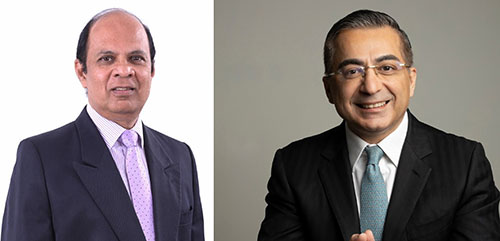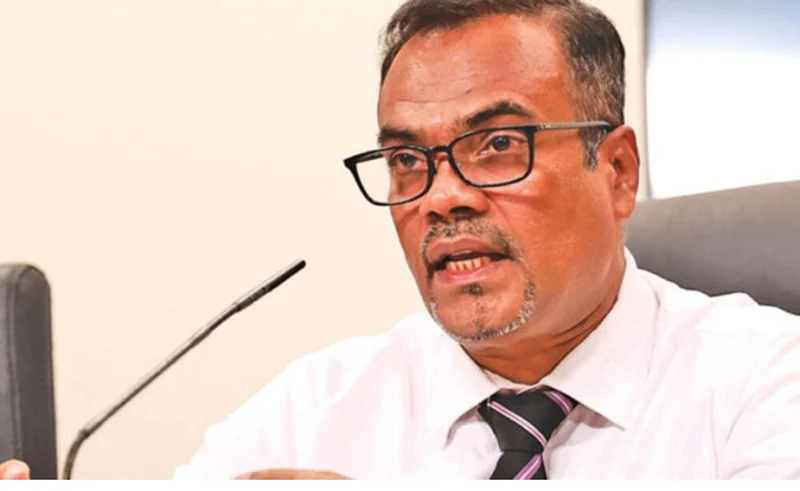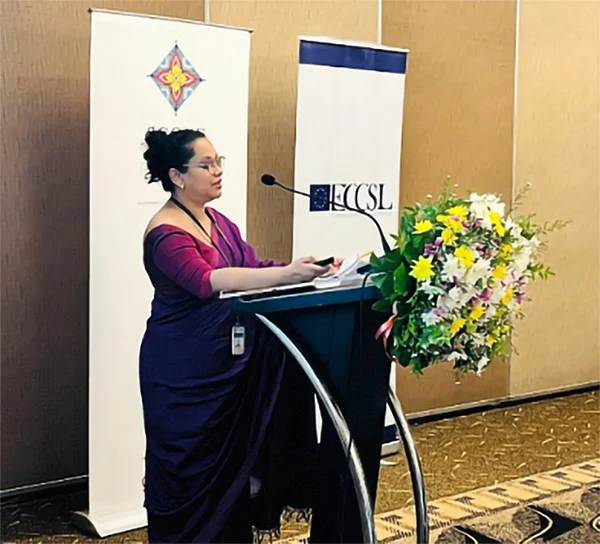Business
EY facilitates discussion on Digital Cities at the FITIS Sri Lanka Internet Day 2021 Forum

Ernst & Young (EY) facilitated a timely discussion on Digital Cities as the knowledge partner at the “Sri Lanka Internet Day 2021”, the inaugural virtual event organized by the Digital Chapter of the Federation of Information Technology in Sri Lanka (FITIS) which was held in line with FITIS mandates on digital economy and regional hub and the 7-pillar digital strategy.
Themed Digital inclusion, the forum emphasized the need for citizen engagement in a digital society and its impact on digital inclusion and also discussed about Sri Lanka’s digital strategy, digitalization initiatives and the need to further enhance digital infrastructure to facilitate a digitally empowered ecosystem.
A major highlight of the forum was the discussion on Digital Cities held with the participation of Arjuna Herath Senior Partner and Head of Consulting at Ernst & Young Sri Lanka and Maldives and Amit Midha president, Asia Pacific and Japan and Global Digital Cities of Dell Technologies. The discussion between Herath and Midha provided deep insights on Digital Cities and laid the foundation for Sri Lankans to look forward to the concept, inspired by the digital models implemented by Singapore and other developed countries.
Herath laying the context for the discussion indicated that Cities have been centers for innovation and economic growth since the perennial times and as a result of that, more and more people migrated to cities in search of jobs and luxury lifestyles. He stated that technology has played a key role in the transformation of cities and that has led to the emergence of the Digital City concept. Midha exploring the topic said, “It is a City that thrives in the fourth industrial revolution”. Midha emphasized the fact that data and data related industries are going to be crucial within the next 30 to 40 years and that everyone needs to transform themselves to be successful in the digital sphere. He highlighted that digital jobs can thrive with new concepts such as Work from Home and Sri Lanka has the capacity to build on that. He also stressed on the importance of a Digital City in helping individuals and societies to transform themselves with access to economic growth, better living standards, better healthcare and education, mobility and new job opportunities, etc.
The discussion emphasized how new technology can be used to facilitate the everyday lives of people. The government’s role in this regard was perceived as vital because if necessary policies are implemented and infrastructure is provided, there is enough talent to build on those advantages and come up with new innovations. Midha emphasized that the private sector must join hands in the development efforts by alluding to the fact that ideas from different segments are vital in making progress.
A Digital City is expected to have streamlined services relating to transport, health, education, and all the primary services that people look forward to. The discussion went on to show a clear pathway where Sri Lanka can adapt the Digital City concept in the long run. According to the thoughts shared, safety is the top most priority for a city because if the city is not safe, people will leave that city. The next pillar is to streamline transportation within the city, from the city and into the city. The third pillar is the development of heath care and education which are considered as two of the primary needs of people living in a city. The next important aspect is the government to work as an app, conveniently assisting to fulfil the needs of people. The focus on sustainability, green energy, smart grid and solar was also highlighted as essential aspects in shifting to the concept.
The discussion also highlighted the need to focus on security when dealing with data and data related projects at a time when hacking, cyber-attacks and data thefts are abundant in the world. “In the process of digitizing cities, intrinsic security is a must have and we need to pay more attention to that going forward.” Says Midha.
Mr. Herath spoke about the opening Sri Lanka has in creating a Digital City with the new Port city in the making and the need to embedding the concepts that were discussed when creating the City including the required leadership and policies, operating models and processes and the community and the ecosystem which also need to be considered. Mr. Midha elaborating on this said “There has to be a vision that has to be built. A dream has to be put out there to get citizens buy in. In fact this is how cities take shape. There is plenty of money in the system. People will help make these cities happen. They need to be told what the dream is, how they can happen, then they buy into this, in fact any public project that makes livability better makes prices of all real estate in the city to go up. So, all the folks know that by doing things right, it is a significant economic return. They also want future generations to have better access to infrastructure and live in a better place.”
Providing a comprehensive outlook on Digital Cities, what advantages these cities have in store for the public and what needs to be done in order to shift towards the new concept, the discussion ended after sharing a wealth of knowledge while acting as an eye opener for the authorities to look forward to maximize the available technologies and embrace the Digital City concept.
Business
President AKD writes to President Trump over trade deficit concerns

In a bid to address mounting trade tensions, the Sri Lankan government has intensified efforts to reduce its significant trade deficit with the United States, Deputy Minister of Economic Development Dr. Anil Jayantha Fernando announced in parliament yesterday. He added that President Anura Kumara Dissanayake has despatched a formal letter to President Trump urging, among other things, a re-assessment of the recent enhanced tariff regime imposed on Sri Lanka.
The move follows reciprocal tariffs imposed by U.S. President Donald Trump, which Sri Lankan authorities say significantly affect key export sectors. The Deputy Minister indicated that the White House has acknowledged receipt of the Lankan President’s letter, signaling the launching of a potential bilateral dialogue.
Responding to a question raised by New Democratic Front (NDF) MP Ravi Karunanayake, Deputy Minister Fernando revealed that 88% of Sri Lanka’s trade deficit over the past five years stemmed from U.S. trade relations with apparel, rubber products, spices, other agricultural products and precious gems constituting 85% of total exports to the U.S. These exports, he noted, already face tariffs and paratariffs, but President Trump’s recent levies were calculated based on bilateral trade imbalances – a factor that has placed Sri Lanka’s economy under heightened pressure.
“The President’s intervention underscores our commitment to protecting Sri Lankan industries and fostering equitable trade terms, Fernando stated, defending the administration’s proactive and reactive measures to mitigate the US tariffs’ impact on local businesses.
Highlighting ongoing engagement, he added that another round of high-level discussions with the Office of the U.S. Trade Representative (USTR) was scheduled overnight. These talks aim to address structural trade imbalances and explore avenues for tariff relief, particularly for Sri Lanka’s apparel sector, which employs millions nationwide.
The President’s letter marks a strategic move in Sri Lanka’s diplomatic outreach, reflecting the government’s urgency to stabilise an economy still recovering from recent crises while in the middle of an IMF programme.
Sri Lankan industry leaders have cautiously welcomed the government’s efforts but emphasise the need for swift, tangible outcomes.
At present, all eyes remain on Washington’s response to President Dissanayake’s appeal – a potential turning point for Sri Lanka’s trade future, observers noted.
By Sanath Nanayakkare
Business
Inclusive and sustainable apparel for SDGs

The European Chamber of Commerce of Sri Lanka (ECCSL), in collaboration with the Strengthening Social Cohesion and Peace in Sri Lanka (SCOPE) programme, recently hosted its third industry-focused event, bringing together apparel-sector stakeholders to exchange experiences and practical insights on embedding inclusivity and sustainability into business operations.
Building on the success of ECCSL’s earlier events focused on tourism and food and agriculture, this apparel-focused gathering convened government representatives, industry leaders, business practitioners and the academia to discuss practical strategies for embedding inclusivity and sustainability into business operations.
While many businesses already recognize the importance of these principles, the event emphasized practical implementation, shifting the conversation from the “why” to the “how” of inclusive and sustainable practices.
Chamindry Saparamadu, Director General of the Sustainable Development Council of Sri Lanka, discussed how the Government of Sri Lanka is supporting businesses to create social and environmental impact through its Inclusive and Sustainable Business (ISB) Strategy. Ms. Saparamadu outlined how this strategy aims to create a resilient, equitable, and sustainable economy by building an ecosystem in which inclusive and sustainable businesses can thrive, driving transformative change across industries.
The event also featured engaging presentations from leading apparel businesses—Omega Line, Hirdaramani, and Compreli Consulting—each showcasing real-world examples of how inclusivity and sustainability can be embedded into business operations.
Omega Line, represented by Saman Jayasinghe (Chief HR Officer, Group – Administration) and Charman Dep (Assistant General Manager – Production Planning), presented its multifaceted sustainability approach, spotlighting its Vavuniya factory as a successful model for combining environmental stewardship with social impact.
Hirdaramani’s Manindri Bandaranayake (Chief Brand & Sustainability Officer for Sri Lanka, Bangladesh, Ethiopia, and Vietnam) showcased the company’s holistic sustainability framework, including its Wonders of Wellbeing (WOW) program, policies supporting differently-abled individuals, and deep community engagement.
Finally, Compreli Consulting co-founders Ramesh De Silva and Shehan Olegasageram showcased their innovative garment repair-as-a-service model—a circular, scalable solution that reduces waste and carbon emissions, while aligning with evolving global sustainability regulations.
Participants then had the opportunity to share their own knowledge in a group discussion, exchanging experiences and reflecting on the challenges and opportunities encountered in their sustainability journeys.
The event underscored the collective benefit of building Sri Lanka’s reputation as a global leader in inclusive and sustainable business. By fostering collaboration between businesses, the academic community and government stakeholders, the session aimed to accelerate broader industry adoption of these principles and contribute to Sri Lanka’s sustainable economic growth.
The discussions were facilitated by the Project Lead of ECCSL’s Inclusive Business Practices project, William Baxter.
Business
Union Assurance records Rs. 5.2 Billion PBT, fortifying its financial position by delivering best-in-class value

Union Assurance PLC, Sri Lanka’s longest-standing private Life Insurer, has recorded a strong financial performance with growth across key metrics for the year ending December 31, 2024. The Company achieved a 15% growth in gross written premium, totalling Rs. 21.6 billion driven by double-digit growth in both regular new business premiums and renewal premiums and paid Rs. 7.7 billion worth of claims and benefits to its customers during the year. In addition, for the year ending December 2024, the Company also declared an industry-leading universal life policyholder dividend rate of 12%, underscoring its continued commitment to deliver exceptional value to its customers.
Net investment income recorded a 9% year-on-year growth to reach Rs. 11.8 billion aided by an effective asset allocation strategy. The gains from the trading investment portfolio increased by 123% to reach Rs. 2.9 billion driven by the strong performance of the Colombo Stock Exchange during the latter part of the year.
Union Assurance distributed Rs. 3 billion as surplus from the policyholder fund and reported a profit after tax of Rs. 3.7 billion for 2024. The Company declared a final shareholder dividend of Rs. 5.00 per share amounting to a total payout of Rs. 2.9 billion.
A key milestone for Union Assurance in 2024 was the surpassing of Rs. 100 billion in total assets for the first time in its history, ending the year with Rs. 109.5 billion. This underscores the Company’s solid financial foundation and growth trajectory.
The Company’s assets under management grew by 15% during the year, reaching Rs. 95.6 billion driven by market valuation gains and cash generation from business operations. Furthermore, Union Assurance’s capital adequacy ratio stood at a healthy 264% at the end of 2024, well above the regulatory minimum of 120%.
-

 Business3 days ago
Business3 days agoColombo Coffee wins coveted management awards
-

 Business5 days ago
Business5 days agoDaraz Sri Lanka ushers in the New Year with 4.4 Avurudu Wasi Pro Max – Sri Lanka’s biggest online Avurudu sale
-

 Features4 days ago
Features4 days agoStarlink in the Global South
-

 Business6 days ago
Business6 days agoStrengthening SDG integration into provincial planning and development process
-

 Business5 days ago
Business5 days agoNew SL Sovereign Bonds win foreign investor confidence
-

 Sports7 days ago
Sports7 days agoTo play or not to play is Richmond’s decision
-

 Features4 days ago
Features4 days agoModi’s Sri Lanka Sojourn
-

 Features17 hours ago
Features17 hours agoSri Lanka’s Foreign Policy amid Geopolitical Transformations: 1990-2024 – Part III











